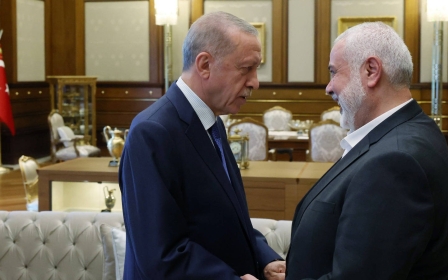Israel-Palestine war: Israel delays ground invasion as US presses for post-Hamas plan

The Biden administration is stuck threading the needle between unconditional support for Israel’s war on Gaza, preventing a wider regional conflict, and its discomfort over Israel's endgame.
On Tuesday, White House spokesman John Kirby sought to put to bed rumors that US unconditional support might be wobbling. The comments suggested that a delay in a ground invasion would not lead to a respite in fighting and would benefit Hamas.
A former senior US official familiar with the Biden administration’s thinking told Middle East Eye that as the war enters its next stage, Washington believes it is seeing the benefits of its unconditional support for Israel.
“Our engagements with the Israelis are helping them to think carefully about what they are about to do, to put up guardrails, and to check rash impulses,” said the former official familiar with the administration’s thinking.
On Wednesday, the Wall Street Journal reported that Israel had agreed to delay its expected ground invasion to allow the US more time to place air defence systems in the region. Netanyahu said later on Wednesday that Israel is preparing a ground invasion but gave no indication of timing or other details.
New MEE newsletter: Jerusalem Dispatch
Sign up to get the latest insights and analysis on Israel-Palestine, alongside Turkey Unpacked and other MEE newsletters
Meanwhile, the US has sent a Terminal High Altitude Area Defense (Thaad) battery and Patriot surface-to-air missiles to the region to bolster its defences, as its forces come under attack by Iranian-backed militias in Iraq and Syria. It hopes the deployment of additional firepower, along with two naval carrier strike groups in the Mediterranean, can also deter Lebanon's Hezbollah.
Besides surging military hardware to its bases and Israel, the Biden administration has taken an unprecedented hands-on approach to the war.
US Defence Secretary Lloyd Austin has held near-daily phone calls with his Israeli counterpart, Yoav Gallant, to discuss operations. During his visit to Israel last week, Biden took the rare step of attending an Israeli war cabinet meeting. The White House has called for an additional $14bn in military aid to Israel.
Meanwhile, the US has sent military advisors to Israel, including Marine Corps Lt. Gen. James Glynn, who was involved in fighting against the Islamic State group in Iraq, according to Axios.
No day-after plan
Israel’s bombardment of Gaza has killed at least 6,546 Palestinians and there are more than 1,500 missing, according to the Palestinian health ministry. More than 70 percent of those killed are children, women and the elderly.
The war erupted on 7 October after Hamas led an attack in southern Israel. According to Israeli officials, around 1,400 people were killed in Israel during the assault, the majority believed to be civilians. At least another 220 people were taken as prisoners in Gaza, including soldiers and civilians.
The delay of the ground invasion buys the US more time as it works to extract hostages and nearly 600 American citizens who are trapped in Gaza. There are 10 Americans among the roughly 22o hostages Hamas is holding, according to US officials. Two were released on Friday.
But the strategy of closely linking itself to Israel's expected ground invasion also poses risks to the US.
“US strength and standing in the region is going to be directly linked to Israel’s performance in the war,” David Schenker, a former State Department official, told MEE. “Even worse than what happened on 7 October for the US, would be Israel getting bogged down in Gaza.”
'What Israel stated as gut-reflex response to the brutal Hamas attack isn’t an achievable objective'
- Liam Collins, former US special forces colonel
But any tactical delay to the ground invasion still fails to address the elephant in the room: Who will govern the Gaza Strip if Israel achieves its stated objective of eliminating Hamas?
MEE reported previously that US officials have asked Israel what its plans for the Gaza Strip would be after a potential ground invasion.
Israeli officials have said they have no plan for the impoverished Mediterranean enclave - home to more than 2.1 million Palestinians - once they are done waging war there.
Aaron David Miller, a former Middle East negotiator at the State Department, said the Biden administration “clearly isn’t happy with what the Israelis have in mind".
“They have all but said publicly it lacks clarity and consistency and doesn’t have a day-after plan,” he said.
And that could be bad news for the US, which has tethered itself so closely to Israel's military operations but is also attempting to portray itself as a broker in the region.
“The US is telling Israel they inherit the reality on the ground after a land invasion,” a former senior US official familiar with the Biden administration’s thinking, told MEE. “And it’s not in anyone’s interest to be caught in a quagmire.”
US lacks bandwidth
The day before Biden's wartime visit to Israel, the Washington Institute for Near East Policy published an analysis of a "Post-Hamas Gaza", which MEE understands some US officials shared with their Israeli counterparts as a roadmap to consider once the group is removed. The paper wasn’t presented as an official request but as one of several options.
The paper recommends an interim administration governing Gaza, with civilian affairs controlled by local Palestinians and security managed by a peacekeeping force of neighbouring Arab states until the Palestinian Authority (PA) can take over. The international community would assist in reconstruction.
The authors said the plan would require "substantive reform" of the PA, which has limited governing power in the occupied West Bank, is widely viewed by Palestinians as a corrupt collaborator with Israel, and whose popularity is at an all-time low.
The plan would require serious buy-in from the US, and there is no indication Washington is actively pursuing it.
Talks with Arab leaders in Jordan and Egypt have focused on the immediate impact of the war, with Jordan’s King Abdullah II and Egyptian President Abdel Fattah el-Sisi drawing red lines against the forced displacement of Palestinians.
Washington’s Arab allies have seen mass demonstrations in support of Palestinians, with some of their citizens even calling for Hamas to hit Israel with more rockets. Cooperating publicly with Israel now to administer Gaza could endanger their rule, experts said.
“The US is asking Israel a question they don’t have the answer to either,” Miller said, adding that Washington “lacked the bandwidth” to meaningfully engage with its Arab partners on a post-Hamas Gaza.
'Israel makes its own decisions'
Meanwhile, the Biden administration continues to publicly back Hamas’s removal. In an NBC interview over the weekend, Secretary of State Anthony Blinken said Israel can’t “go back to the status quo” with Hamas governing the enclave.
Biden says he is opposed to Israel occupying Gaza, but has side-stepped questions about whether he backs an immediate full-scale invasion of the enclave. “The Israelis are making their own decisions,” he said, when asked on Tuesday.
Liam Collins, a retired US special forces colonel and professor at the United States Military Academy at West Point, told MEE that the Biden administration was stuck backing the war aims of an ally and it would likely have to be scaled back.
“What Israel stated as gut-reflex response to the brutal Hamas attack isn’t an achievable objective,” he told MEE.
“Degrading Hamas can be done, but it’s not realistic to eliminate Hamas, militarily or politically. You can’t do that unless you address the underlying roots of the conflict,” he said.
Middle East Eye delivers independent and unrivalled coverage and analysis of the Middle East, North Africa and beyond. To learn more about republishing this content and the associated fees, please fill out this form. More about MEE can be found here.





